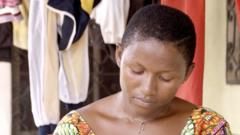In the beleaguered English-speaking regions of Cameroon, the ongoing civil strife has rendered life perilous. Families like that of Ngabi Dora Tue grapple with horrific losses, a reality underscored by the brutal murder of her husband, Johnson Mabia, four years ago at the hands of armed separatists. The region, predominantly Francophone, has become a battleground for a conflict that initially erupted from protests over perceived marginalization of the English-speaking minority.
Johnson, a civil servant, was captured alongside colleagues, with separatists demanding a ransom for their release. Tragically, Johnson was killed, his body showing signs of horrendous violence, as the mournful community of Limbe faced yet another loss. The struggle for independence from the central government has escalated into hostilities that have claimed thousands of lives, displaced hundreds of thousands, and disrupted daily life.
The roots of this decades-long crisis trace back to grievances arising from a unified Cameroonian state formation post-independence. The peaceful protests that began in 2016 against the imposition of Francophone legal norms quickly devolved into violent crackdowns by security forces, leading to widespread backlash and the rise of armed separatist groups. In 2017, leaders declared an independent "Federal Republic of Ambazonia," further intensifying the turmoil as five million Anglophones became embroiled in the conflict.
Journalists like Blaise Eyong narrate the grim realities of life in this conflict zone, witnessing daily atrocities rather than normality. Attempts, including a national dialogue, have failed to yield meaningful resolutions, with persistence of violence leading to disillusionment among locals regarding both separatists and government forces. Reports of state-driven abuses, including unlawful killings and tortures, have drawn international attention, with groups like Human Rights Watch documenting these human rights violations.
The ongoing violence is further complicated by rival militant factions within the separatist movements, leading to a fragmented struggle for autonomy. Individuals like John—who suffered torture under government suspicion—illustrate the pervasive fear that grips the population. This fear extends to children, as educational opportunities dwindle; nearly half the schools in the anglophone region are now closed to avoid being used as instruments of state propaganda.
Tragically, families continue to face kidnapping and violence; stories like Joe's reveal the grim realities of abduction and execution amidst the chaos. While some find a way back to their families, others face the unthinkable pain of unending loss. As Ngabi Dora Tue navigates her newfound solitude as a widow with children to care for, the bleakness of her situation symbolizes the larger plight of many caught in this ruthless conflict.
Amidst these harrowing narratives, the Ambazonia Defense Forces claim to operate within international law, distancing themselves from alleged attacks, yet the veil of violence seemingly engulfs all. As the struggle for resolution presses on, the voices of those affected insist that immediate attention to the humanitarian crisis is critical to reclaiming safety and restoring hope to the affected populations.
Johnson, a civil servant, was captured alongside colleagues, with separatists demanding a ransom for their release. Tragically, Johnson was killed, his body showing signs of horrendous violence, as the mournful community of Limbe faced yet another loss. The struggle for independence from the central government has escalated into hostilities that have claimed thousands of lives, displaced hundreds of thousands, and disrupted daily life.
The roots of this decades-long crisis trace back to grievances arising from a unified Cameroonian state formation post-independence. The peaceful protests that began in 2016 against the imposition of Francophone legal norms quickly devolved into violent crackdowns by security forces, leading to widespread backlash and the rise of armed separatist groups. In 2017, leaders declared an independent "Federal Republic of Ambazonia," further intensifying the turmoil as five million Anglophones became embroiled in the conflict.
Journalists like Blaise Eyong narrate the grim realities of life in this conflict zone, witnessing daily atrocities rather than normality. Attempts, including a national dialogue, have failed to yield meaningful resolutions, with persistence of violence leading to disillusionment among locals regarding both separatists and government forces. Reports of state-driven abuses, including unlawful killings and tortures, have drawn international attention, with groups like Human Rights Watch documenting these human rights violations.
The ongoing violence is further complicated by rival militant factions within the separatist movements, leading to a fragmented struggle for autonomy. Individuals like John—who suffered torture under government suspicion—illustrate the pervasive fear that grips the population. This fear extends to children, as educational opportunities dwindle; nearly half the schools in the anglophone region are now closed to avoid being used as instruments of state propaganda.
Tragically, families continue to face kidnapping and violence; stories like Joe's reveal the grim realities of abduction and execution amidst the chaos. While some find a way back to their families, others face the unthinkable pain of unending loss. As Ngabi Dora Tue navigates her newfound solitude as a widow with children to care for, the bleakness of her situation symbolizes the larger plight of many caught in this ruthless conflict.
Amidst these harrowing narratives, the Ambazonia Defense Forces claim to operate within international law, distancing themselves from alleged attacks, yet the veil of violence seemingly engulfs all. As the struggle for resolution presses on, the voices of those affected insist that immediate attention to the humanitarian crisis is critical to reclaiming safety and restoring hope to the affected populations.


















